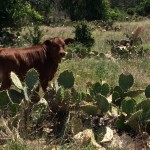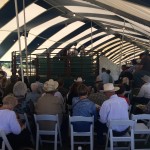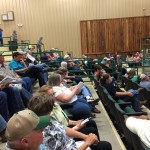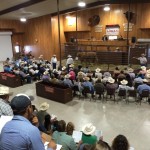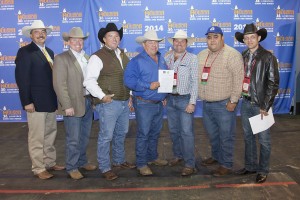Blog
Vote Yes for Texas Beef Checkoff June 2-6
What: Texans can help determine the future of the beef industry by voting yes on a state beef checkoff. Supported by the Texas Purebred Cattle Alliance and leading Texas cattle industry organizations, we need your help to ensure the success of this program.
Why: A vote in favor of a state beef checkoff is a vote in favor of the ranching way of life. It’s a vote for increased research and promotion, which could ultimately lead to increased demand for beef. Most importantly, it’s a vote against radical anti-agriculture groups like HSUS and PETA, which threaten our livelihood each day. TOGETHER we can determine the future of beef in Texas.
Who: Any producer, regardless of age, who has owned cattle in Texas any time between June 6, 2013, and June 6, 2014, is eligible to vote in the referendum. For purposes of this referendum, a producer may be either an individual or a legal business entity. Youth younger than 16 years of age must have a parent or guardian co-sign the ballot. A non-producer (i.e. dealer, order buyer, etc.) is not eligible to vote in the referendum.
Where: Eligible producers may vote at any Texas A&M AgriLife Extension Service county office, regardless of where your cattle are located or where you live.
When: VOTE YES June 2-6 2014!
More Info: www.texasbeefcheckoff.com
Tales From The Road 2.0
Beefmaster Breeders United (BBU) keeps you updated with what is happening in the Beefmaster world and the cattle industry. In this video we are visiting with the new Beefmaster Breeders United Executive Vice President, Mr. Bill Pendergrass.
Tales From The Road 1.9
It has been a great couple of weekends for Beefmaster Breeders United at the L2 Ranch Production Sale, the Live Oak BBA Kentucky Derby Sale and the Central States BBA convention and sale. Cattle sold steady to high with some opens selling as high as 11k and pairs over 10k. Beefmaster cattle are in high demand and cattle with the combination of outstanding phenotypes, pedigrees, EPDs and carcass data are in the highest demand! We are excited to keep this hot streak going into this weekend at the Emmons Ranch Production Sale in Fairfield, Texas!
– BBU Marketing and Member Service Coordinator, Ryan Cummins
Pitching Great, Nolan Ryan Brings Heat in New Cookbook
BBU and NCBA are Opposed to EPA Expansion
The letter, that is addressed to Chairman Shuster and Ranking Member Rahall, urged “Congress to stop the proposed expansion of federal authority under the Clean Water Act (CWA), and to limit the U.S. Environmental Protection Agency’s (EPA) ability to unilaterally halt job-creating projects. EPA and the Army Corps of Engineers’ recent activities will federalize our nation’s waters and public and private lands, resulting in dramatic impacts on job creation and economic investment and growth.”
The letter that was drafted and submitted by the NCBA Washington, D.C., office included the following excerpts…
“Nearly every sector of the economy – including agriculture, construction, housing, manufacturing, utilities, energy production, and transportation – requires Section 404 and other CWA permits to conduct their daily operations. Just as importantly, private property owners who want to develop their own land, as well as state and local governments building critical infrastructure, must also frequently obtain 404 permits. Twice the Supreme Court has affirmed that both the U.S. Constitution and the CWA place limits on federal authority over intrastate waters, and Congress has declined to alter that careful balance between federal and state regulation of waters. Yet EPA and the Corps are now attempting to substitute their own judgment for that of Congress, and to unlawfully expand the scope of federal jurisdiction beyond anything that has ever existed under the CWA.”
“EPA has already provided two telling examples of what can happen to U.S. projects that require federal CWA permits. Notably, EPA for the first time ever recently used Section 404 to retroactively veto a valid CWA permit, thereby halting an on-going lawful operation. EPA then used Section 404 to prospectively veto another project before the companies involved could even apply for a permit, but after hundreds of millions of dollars had been spent in up-front capital expenditures. If EPA is allowed to continue in this manner, and indeed to expand its authority over more land, it will have a devastating impact on U.S. investment and job creation, as companies will not be able to rely on the rule of law in the United States and will not invest in U.S. projects.”
“The undersigned organizations are committed to the protection and restoration of America’s water resources. And while the environmental protections provided by the CWA are vital, so too is the rule of law and the ability of investors to rely on the U.S. permitting process. Congress must act to protect both by requiring federal agencies to recognize the legal limits to CWA authority, and ensuring that EPA exercises its CWA authority in a manner consistent with due process and fundamental fairness.”
“It is critical that the federal government use the legally promulgated processes under the CWA and National Environmental Policy Act to make fair, informed decisions about job-creating projects. It is likewise vital that, once companies receive their permits, the companies – as well as the investors and employees relying on them – can rely on those permits to not be revoked at any time for any reason. Finally, it is extremely important that EPA and the Corps not be permitted to arrogate authority to themselves that Congress never intended.”
A Business of Beefmasters
Written by Lynzee Glass: Ozarks Farm & Neighbors
Managing Flying Miner Ranch like a true business and budgeting every expense is the recipe for success according to Parker Vandivort of Hartville, Mo.
“The best thing we ever did for our farm is turned it into a business,†explained Parker. “I get a salary just like any other job. This is a business not a hobby. Everything is budgeted each year, this not only helps us financially but also keeps us accountable for every decision made on the farm.â€
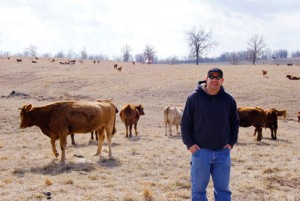
Beefmaster Breeders United member L P Vandivort Inc., Flying Miner Ranch of Hartville, Mo., made Beefmasters his business.
He continued, “That has been our biggest stride in the past five years. It’s been sustainable and took a lot of pressure off of us and made it fun.â€
Flying Miner Ranch is scattered on leased and owned land in Wright County. It all started around 2000 when Parker’s father, Andy Vandivort, purchased land in Missouri. In 2004, after graduating from college, Parker moved from El Paso, Texas, to the farm.
“Dad and I always wanted a ranch. We thought Missouri was the right place because we liked the rain,†said Parker.
Andy’s side of the family farmed in Missouri raising Limousin cattle, so the move to Missouri made sense. When they purchased the farm a lot of work was to be done. They split up pastures using high-tensile electric fencing and installed a working facility.
“Today, we use an intensive rotational grazing system,†said Andy.
Parker added, “I learned a lot about grazing systems from my in-laws, Steve and Judy Freeman, and from attending grazing school.â€
Originally Parker and Andy ran mostly commercial Limousin and Angus cattle but they quickly realized another breed would be more suited for their farm. “Our farm doesn’t have much shade, so we wanted an animal that was heat tolerant. My in-laws had started buying a few Beefmasters so I started studying the breed,†stated Parker.
After attending a sale in Colorado about six years ago they decided to make the switch to Beefmaster. His first bulls were bought from Watt Casey Beefmaster of Texas. “We’ve really only bought foundation animals,†said Parker. “Watt Casey is the brother-in-law of Tom Lasater, the breed founder. They have been line breeding for over 60 years. To me foundation animals look a little bit different from other Beefmasters – they have smaller ears and tighter skin.â€
Two years ago Parker purchased 56 registered Beefmaster cows from Lasater Beefmasters of Texas and added the registered animals to his commercial herd that is half Beefmaster. The goal is to have a purebred herd through breeding up.
Flying Miner Ranch has seen many advantages to raising Beefmasters including heat tolerance, parasite resistance, exceptional growth, udder size and minimal inputs. “Our animals are selected based on the six essentials: disposition, fertility, weight, conformation, hardiness and milk production,†said Parker. “We like focusing on the six essentials rather then EPDs.â€
Flying Miner Ranch uses a multi-sire formula for a 60-day calving window. Right now they have both a spring and fall calving herd but are heading to a spring herd.
At calving the calves are tagged and weighed, followed by respiratory and blackleg vaccinations at 2 1/2 months old. Calves are fenceline weaned at 10 months old. Parker explained, “Fenceline weaning seems to work really well. It cuts down on stress. We are contemplating on weaning at 9 months to give momma an extra month to put on condition. Even though the mommas have practically weaned the calves themselves they do still give some milk. I learned from other people that even though it might be a lot less milk, it still helps with digesting grass.â€
Calves are then backgrounded and sold at the sale barn. “We market in August or September because our cows really shine in the heat,†stated Parker.
Once the calves are sold, Parker stockpiles the pastures. When it comes to his grazing system Parker pays close attention to the stage of growth and then moves cattle according to what stage the pasture is in.
“We graze different at different times of the year,†said Andy. “We do a lot of mob grazing where we run a couple hundred head at once.â€
Parker explained that one major benefit of rotational grazing is the reintroduction of new species in the field, like clover and lespedeza. Tire tanks, spring tanks and fenced ponds accompany the grazing system.
When it comes to hay, Parker said, “We try not to feed much hay. We budget enough to purchase 2 1/2 months worth of hay. From time to time we supplement with clover hay.â€
All of their hay is purchased from producers who fertilize and seed. “We try to buy the very best hay, that way it is not only used as feed but it also fertilizes and reseeds the pastures as we unroll. We try to keep all of our hay under cover for quality control; if we don’t use it this year we can still feed it next year,†added Parker.
On top of running his own herd of Beefmasters, Parker also custom grazes for other people.
Parker said when it comes to running the farm he has a reliable team. “My wife, Jennifer, handles the paper work, record keeping, payroll and taxes. My dad is also a big help with labor and organization.â€
Parker and Jennifer just welcomed their first child, Norah Rae, to the farm.
Guest Blog – No Bull: EPA Aggression Threatens Livestock Producers
Beefmaster Genetics for Export
By: Bill Pendergrass, BBU Executive Vice President
The Beefmaster Breeders United (BBU) International Committee has been working tirelessly for the past several years to spotlight how Beefmaster genetics can add significant value and efficiency to cattle operations around the globe. 2014 has been a crowning achievement for this group of hard working members as world wide interest in Beefmaster genetics has reached new peaks.
Cattlemen from Columbia, Nicaragua, Mexico, Thailand, Poland, Italy and Malaysia, to name a few countries, have been working closely with BBU International Committee members to source and expedite exports of Beefmaster genetics to their counties. The volume of interest from countries looking to import American bovine genetics has increased dramatically over the past few years. BBU anticipates this trend to continue and the International Committee is working hard to keep Beefmasters positioned as one of the most exported breeds in the U.S.
While there is strong interest in Beefmaster genetics in the export market, it is very important for breeders to understand that qualifying genetics for export is an expensive, time consuming and often times frustrating endeavor. It is strongly recommended that breeders do their research on the required tests and certifications for live cattle, semen and embryos before they collect bulls, flush cows or commit to live cattle exports. Having said that, many breeders have accepted the challenge and have done the required work to make their genetics as attractive to international buyers as possible.
BBU is creating a database of members who have exportable genetics available and/or are interested in working with parties who are seeking Beefmaster genetics for export. Having a current list of breeders, contact info and their inventories of CSS semen, exportable embryos and live cattle is essential to assisting interested international parties when they contact BBU as they begin their search for exportable genetics.
Please contact the BBU office at 210-732-3132 to be added to the BBU International Export Listing.
Beefmasters UNITED in Efforts to Advance the Breed
By: Bill Pendergrass, BBU Executive Vice President
Perhaps the most important word most often used in conjunction with the word “Beefmaster†is UNITED. The use of the very word UNITED is indeed powerful. Our forefathers revolted against the world’s only superpower at the time, to create this great nation we now live in…had they not UNITED behind the common cause of freedom, we would be subjects of the British crown today. As Beefmaster breeders we must always remember the pathway to success begins by being UNITED as we advance this great breed of cattle.
My vision for the success of Beefmaster Breeders United and BBU members hinges on being united as a team. I realize that different programs have various emphasis and goals. Competition between individuals is only natural; indeed competition makes the cattle, breeding programs and the breed better overall. However, we must remember to UNITE as a breed so that we can better compete with our competition for market share in the commercial sector of the beef industry. At the end of the day, we are all Beefmaster breeders and our shared goal is the success of the breed and your Association.
By the time this article gets to you, the spring bull season will be in full swing. Beefmaster bull sales from this past fall and into the early spring have been very strong. The demand for Beefmaster bulls from the commercial sector has been a driving force of this upswing. I would argue that the success of any purebred program and ultimately breed association comes from the ability of that breed to market range bulls. The single biggest revenue generator for any breeder is probably bull sales, with the majority of them going to commercial herds.
While we are the most maternal breed in the industry, we must always remember that our bulls are the best tool to add much needed HETEROSIS to a national cowherd that according the February issue of BEEF magazine, is 51 percent straight British. As commercial cattlemen add more Angus to their operation they are ultimately increasing market share for the breed(s) that can best improve the productivity for that herd. Beefmaster bulls are the best product on these commercial cows. It is incumbent upon us to produce the kind of Beefmaster bulls these cattlemen are demanding.
We are nearing the end of stock show season in Texas and what a season it has been for the Beefmaster breed! Beefmasters were either the largest or second largest breed shows in both junior and open shows at the Fort Worth Stock Show and Rodeo and the San Antonio Livestock Show and Rodeo. As for the highly competitive San Antonio All Breed Bull Sale and Commercial Replacement Female Sale, Beefmasters once again took home Grand Champion Commercial Heifer awards (for the second year in a row) and we also had the third high selling bull across all breeds.
Nicaraguan Genetic Agreement Signed with FAGANIC
SAN ANTONIO – Beefmaster Breeders United (BBU) is proud to announce that an agreement with the Federacion De Asociaciones Ganaderos De Nicaragua (FAGANIC) to provide frozen Beefmaster genetics to the cattlemen of Nicaragua was signed on March 8, 2014. The formal agreement was signed and finalized at the Houston Livestock Show and Rodeo in coordination with an annual Beefmaster sale. At the agreement signing, BBU was represented by Executive Vice President Bill Pendergrass, Chief Financial Officer Collin Osbourn, International Committee Co-Chairman Lorenzo Lasater and President Steve Emmons. FAGANIC was represented by FAGANIC Secretary Alvaro Vargas, Federico Tablada and Giovani Capriotti.
Nicaragua has seven million beef cows and represents a critical Central American market. The industry there is seeking to improve a number of traits for which Beefmasters are a perfect fit: hardiness in a tropical climate, improved carcass quality, increased weights and most significantly, reduced ages to heifer fertility and steer slaughter weight.
FAGANIC is a very influential national association of state and regional cattle organizations, much like the National Cattlemen’s Beef Association (NCBA) in the United States. They are providing the semen, as well as technical assistance with Artificial Insemination and management to Nicaraguan ranchers.
“The partnership with FAGANIC is an important step to introducing Beefmasters to the cattle industry of Nicaragua. We look forward to helping the ranchers there improve their beef quality and production traits,†said Lasater.
BBU will also assist with marketing, education and participation of cattle events in Nicaragua to promote the Beefmaster breed.
For more information about the international marketing efforts of Beefmaster cattle or the Nicaraguan agreement, please contact the BBU staff members at 210-732-3132 or visit www.beefmasters.org. Stay connected to BBU through Facebook, follow us on Instagram, view our videos on YouTube, follow us on Twitter and Pinterest, as well as receive our news updates through joining our mailing list.









